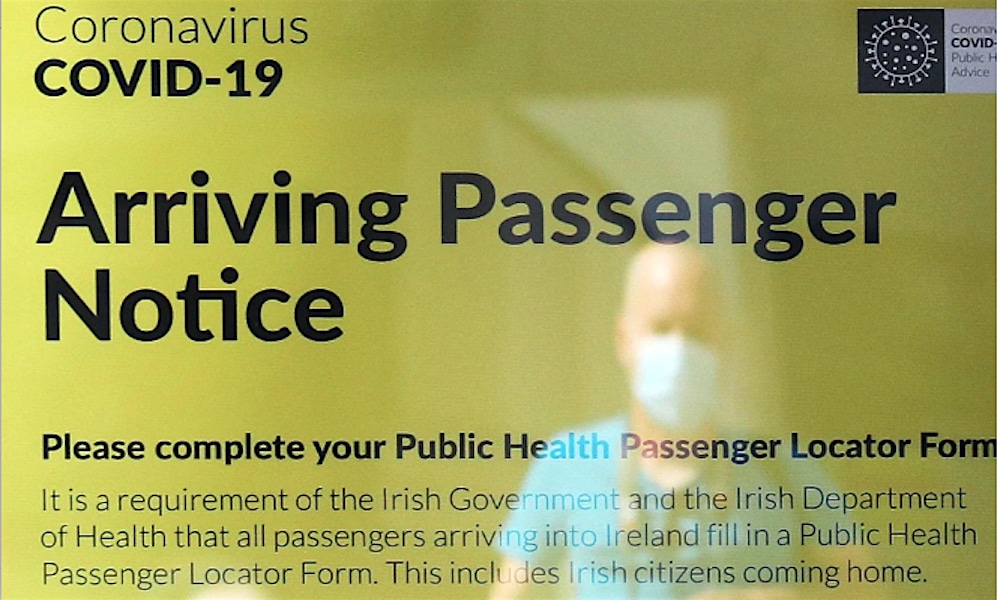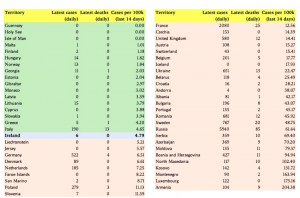
The Irish Government finally published its ‘Green List’ of 15 countries that it deemed as safe for travel with “normal precautions”: Malta, Finland, Hungary, Norway, Estonia, Gibraltar, Monaco, Latvia, Lithuania, Cyprus, Slovakia, Greece, Greenland, Italy, and San Marino. However, the daa will today tell the Oireachtas Committee on Covid-19 Response that travel to these countries represented only 9% of traffic at Dublin and Cork Airports in 2019.
The daa will also say that keeping the airports open with minimal traffic is costing €1 million per day and will suggest that the State will have to intervene in light of the significant financial losses that are putting the delivery of strategic airport infrastructure at risk. It will call for “funding for pandemic safety measures, waivers for rates and State agency fees and an incentive fund for the development of air services”. The daa will suggest that “passengers are required to undertake a Covid-19 test 72 hours or less before travel and submit proof of a negative test prior to travel”.
Meanwhile, Ryanair will tell the Oireachtas Committee that it is not clear what is permitted by ‘essential travel’, or the extent to which people are required to restrict their movements – and that the restrictions can be easily circumvented by flying in and out of Northern Ireland.
The 15 countries have rates of coronavirus cases that are said to be similar or lower than that currently in Ireland – with the exception of San Marino which had 8.71 cases per 100,000 over the previous 14 days, compared with Ireland’s 4.79.
San Marino is not a member of the EU, whereas the other 14 countries are member states – which is presumably why non-member states Guernsey, the Holy See, Isle of Man, and Georgia were not included, all of which had significantly lower cases per 100,000 than Ireland. Greenland, which had no deaths from Covid-19 and only 13 cases, all now recovered, is part of the EU, but Denmark, which had 6.61 cases per 100,00, was not included on the list.

Passengers entering Ireland from these 15 countries are not required to spend 14 days in ‘quarantine’ or self-isolation – and the Department of Foreign Affairs has changed its advise re these countries to ‘Normal precautions’. Travel insurance companies have been establishing whether this means that their policies, some of which now include Covid-19 cover, will provide their policy holders with cover – something that travel agents should advise their clients to check carefully.
Otherwise, the DFA continues to advise against ‘non-essential’ travel overseas, including all travel by cruise ship and to Britain, but this advice does not apply to Northern Ireland.
The Green List is to be reviewed every two weeks and – as holidaymakers already in or with flights booked to Spain from Northern Ireland learnt overnight – this could mean that countries are removed from, or added to, the Green List every 14 days.
If they are not concerned about travel insurance, Irish residents can, of course, travel to a Green List country within the Schengen area, visit Schengen countries not on the Green List, return to Ireland from the Green List country, and Irish authorities need be none the wiser. Ten of the 15 are Schengen countries: Estonia, Finland, Greece, Hungary, Italy, Latvia, Lithuania, Malta, Norway, and Slovakia.
In response to comments that Gibraltar, Greenland, and Monaco can only be accessed from Ireland by flying via a country that is not on the Green List, the Government said that it concurred with the World Health Organisation that it was not concerned about airport transits in ‘non-Green’ countries. However, the Green List has been limited to countries in Europe, whereas there are currently 13 countries in the world that have no cases of Covid-19 at all, and 17 more with less than 10 cases, compared to Ireland’s 764.
The Green List has also been criticised for being a ‘blunt instrument’ by, for example, treating Spain as one territory and not recognising regional variations in Covid-19 status such as in the Canary Islands or Balaeric Islands, or by treating Madeira the same as mainland Portugal.




